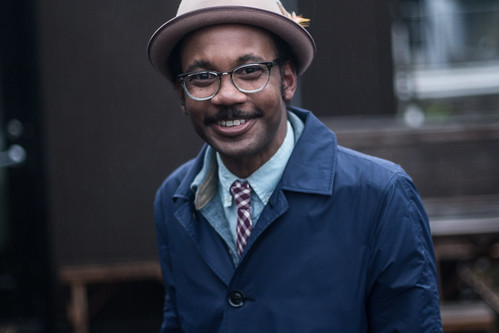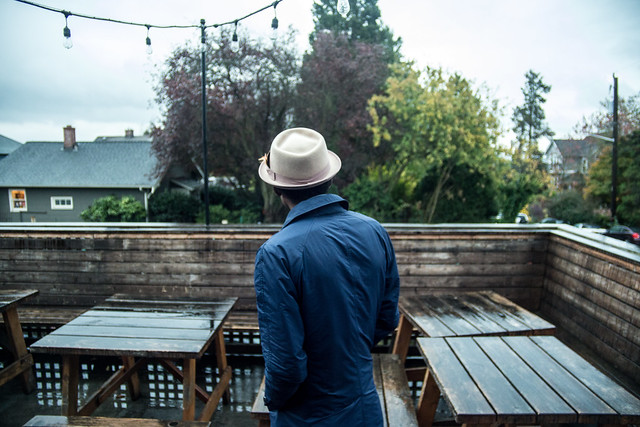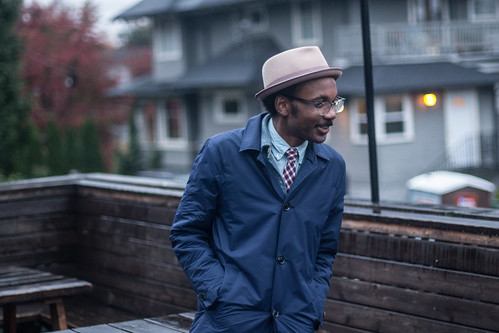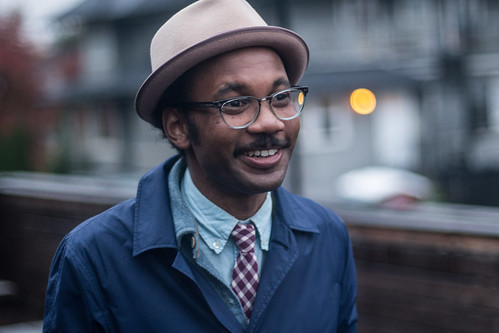
Noel Brass, Jr. sits at the back of Cafe Vita in Greenwood, quietly sipping on an espresso. He's immediately recognizable — it's hard to find a photo of Brass where he isn't wearing his trademark fedora and glasses. It's a rainy November afternoon and I can't think of a better setting to dive into talking about his new record Broken Cloud Orchestra, a collection of ambient synthesizer tracks infused with hints of jazz and soul out now via Wax Thematique Records.
Much like his music, Brass himself is a calming presence. He carries himself with a flair of old school tradition, dressed sharply in a tie and raincoat. But when he talks, you really start to get the feel for his astuteness to the world around him. His music often reflects imagery of the cosmos and far out, spacey ideas. Broken Cloud Orchestra is no exception. The term "head in the clouds" implies a certain aloofness, but Brass gives off the air of a dreamer without losing his footing and forgetting the inspiration right around him.
Brass originally hails from Joliet, Illinois. It's a town, he notes, most known for being where The Blues Brothers are in prison at the beginning of their eponymous film. Joliet is a suburb just outside of Chicago, allowing Brass to cut his teeth in music between both towns. It's in Illinois that he started to develop his far-ranging taste, from ambient and jazz to punk and shoegaze. He can shift conversation seamlessly between Bud Powell and The Smiths with comments about Brian Eno and Vangelis interspersed throughout. His voracious hunt for new sounds is part of what makes his own work so compelling. He's an artist that's hard to pin down to any genre — not for the sake of being undefined, but by the very nature of how Brass creates. He's a searcher.
"I'm always trying to keep my ear open," Brass tells me. "There's good music in every area."
Ten years ago, Brass took a trip to visit Seattle and shortly after decided to move here. He says there were "a lot of reasons" for the move, but mostly he wanted a change of setting. Within a month of transplanting himself, he formed his improvisational psych-jazz-ambient group Afrocop and started a residency at The Stepping Stone in Ballard. The band is still active today. Some members have come and gone, but Brass continues to find new territory to explore with the group and has found collaborators that are just as privy to following their instincts and emotions.
If Afrocop is kinetic energy between its members, listening to Broken Cloud Orchestra is to be immersed in Brass' world. For half an hour he takes us across the universe via waves of synthesizer drones and the soulful clatter of electric keyboards. It's a deeply moving work, unique in execution but tapping into ubiquitous themes of love and longing. At the back of the coffee shop, Brass opens up just a little bit more of his world and reveals a bit about his philosophy for creating these enveloping sounds.

KEXP: Do you feel like it's important to keep yourself open to new music and sounds? Does it help your own music from getting "stale?"
Noel Brass Jr: Even when I was getting into jazz, I was like, "I like jazz and this is amazing, I appreciate the artists," but I kinda started to draw away from the scene of jazz. I was kind of pushed out of the scene in Joliet, I just felt a little detached. It felt more like a competition... it's more of a sport to some people, I guess. I just wanted the purest way to put my art out. You kind of want to create your own mythos in some way and your own sound. You know, some people do a certain thing that sounds like other things. I wanted to create my own thing, which I kinda did with my solo work and what I'm trying to do still even though I'm inspired by so much.
KEXP: Is jazz where you started?
Brass: It was electronic, weird jazz. I started playing synths and I started making some ambient records. Sometimes I'd use a drum machine. I guess it was electronic, ambient, synth weird shit. I'd play with other dudes and we'd improvise. Then I got really into psychedelic rock and jazz, fusion. I got into space rock like Spiritualized. Shoegaze. A lot of different stuff. I've just always had big ears. You know, Vangelis, I was into that. But I was also listening to Jimmy Smith and all this weird soul, R&B. I got more into jazz, but I got more into other things too. Always grabbing for sounds.
KEXP: Do you feel like you have to intentionally seek out new sounds or are you just so open that you just find these things?
Brass: I think it's kind of both. I'm kind of always testing out new acts and always wanting to be caught off guard. Not in a bad way, but I always want to be challenged. I don't want to stop learning. I think that was one of my fears... where you're having these weird dreams where you think you're going to max out what you can do on a keyboard or what you can do with a synth. But it's impossible, really. If you're always digging and trying to search for me, it's not really gonna happen. I've learned a lot from the other musicians I've played with it. I've humbled myself. I don't know everything, you know.
KEXP: On Afrocop's website, you mentioned that you started the group as an outlet for your "psychedelic gospel leanings." Could you tell me a little bit about the formation of that group and starting with that idea?
Brass: I always felt that improvisation was always the key to finding truly the most beautiful, you know — people say psychedelic music — but stuff that's tribalistic or it's got the African feel, it's got Latin feel, it's got whatever feeling you've experienced. I wouldn't necessarily want to tell someone how to play something, like a drummer or a bass player or guitarist. It's more or less like an ethos that we share and everybody would add pieces to this evergrowing puzzle. I never wanted it to be the same thing repeated twice. I felt like improvisation was the way to do it. And that's what was Afrocop. Some people get it, other people don't.
We've had a couple different members swap in and out. Some people wanted to take it one in one direction. It's like anything, you just have to have a shared goal and a shared vision or else it's kind of boring. It's like an open door, open soul policy. Everybody would input their ideas. Things come and go and people leave if they don't feel like they're putting in good things. Otherwise, we talk about things. I get along with them so well, it's easier to let them speak and me listen. And vice versa. It's very respectful.
KEXP: It seems like a really beautiful and holistic way to make music — to make yourself that open.
Brass: Absolutely. We had been doing so many different ideas on what we were gonna do live. We'd do films when we played at Olaf's for a while. We'd just have films playing in the background like, 2001 and THX 1138. We were doing that for a while, just doing improvised soundtracks. It'd give us something to play off of rather than just looking at each other. We're playing off of visuals a lot now with a good buddy, John Theroux. He does CTPAK Visuals Crew. He's a big improviser with the visual spectrum.
Like you said, a holistic approach. You don't have to make up what it is, even. Just let things happen. If they feel strange or you feel like you're going into a dark place, you gotta experience that stuff. That's how life is. You can't just go through feeling great and all major changes and all this beautiful stuff. Sometimes you just gotta go dark.
That's gotta be a great way to get to know someone, too. If you're playing and it goes to that dark place, you're going there with them. That's kind of intense. I think that is a very intense thing. I think that's the whole idea of it. You're diving into yourself and others. And that's okay by me [laughs].

KEXP: Going off of what you're saying about playing with other people... By nature, your solo work has got to be more introspective – right?
Brass: It definitely is. I've been recording solo works for 15, 16, 17 years now. You know, you're always kind of in the similar place. You have a place you go to for it.
It takes a lot. I think the music can come out easily, but the feelings can be overwhelming from it. Just going back and working on it again and being like, "Woah." It gets you in a place where you're just like, "Damn, I wasn't even thinking about it when I was letting it go." When you actually go back and revisit and see what it is, it can be kind of scary. Not scary like "boo," but scary in like a soul setting. You have to nurture the solo thing. It does feel vulnerable.
You've probably seen some of the songs titles. That's the hardest thing for me – coming up with song titles. You're kind of being suggestive rather than just, "here's the music that's coming out." Song titles are giving someone cinema, basically. It took me longer to come up with [titles] than it would to even create [songs] sometimes. People will be like, "Why don't you just name it anything?" You gotta have some meaning to it.
KEXP: I really liked the song titles. They're emotionally evocative and it adds to the experience.
Brass: Adds a little bit more depth to it. I've always done that. I've always tried to make it feel like that because otherwise, it doesn't feel like anything. There's a lot of ambient music that draws you away from it, so you're almost spaced out or zonked out almost. I kinda wanted to bring in. Even though it's spacey music, you still want to have that feel to it. Soul, ambient basically. One of the first discs I made when I [started] recording, I called one thing "Soulgazer." Like soul and shoegazer combined [laughs]. Even though it was just an idea I had, it was kind of the direction I wanted to go. I thought it would be cool to play around with cross-blending things, like Vangelis with soul. It's fun [laughs].
KEXP: I was gonna ask you about that name and idea. It seems like "soulgaze" can have a lot of connotations to it.
Brass: It's just double wordplay. Taking things that meaning from this and adding it to this. Just playing around with words and seeing what works. Same with songs. It's good to do that stuff to challenge yourself. It kinda sounds like the oblique strategy stuff with the cards – the Brian Eno cards – where you're giving yourself challenges in different ways to look at things.
I'd start off by writing stuff, writing something down in my notepad, then looking at it and being like, "Oh, I could come up with a song like that." It doesn't always work, but it's another way to tap into something else. Trying, at least.
KEXP: So before you even write a song, you have an idea you write down...
Brass: Or, sometimes, the same thing happens with Afrocop since it's live improv. I'll go to a spreadsheet and we have a bunch of song titles... There's like 800 different things in there. I'm always writing words and playing together anyway.

KEXP: Playing instrumental music, by nature without having lyrics – I won't say it's harder to have an emotion, but it's less clear than when you have someone singing about how they feel. So, it's really cool how you do that process with your titles.
Brass: Or it could be a mantra. Sometimes people think it's cheesy, talking about love too much or whatever [laughs]. But, you know, what else is there?
KEXP: Do you write at all? Like poetry?
Brass: Yeah, that's where I get a lot of ideas from. You know how it is – music isn't enough, love ain't enough. I think people who feel a lot sometimes can't be satisfied. That sounds like difficult blues shit, but it's kind of true. You're just always searching, with everything, I guess. That's how I feel. It creates all sorts of double-edged swords. It creates anxiety but it also creates beautiful music. Writing's definitely helpful. Every type of inspirational input you can enjoy yourself without getting overwhelmed.
KEXP: There's a lot of cosmic, sci-fi imagery in your solo work and Afrocop. What draws you to that type of imagery?
Brass: Just searching the unknown, mostly. I guess it's just a natural curiosity for most people who are curious about life and dreams and such.
KEXP: Do you read a lot of sci-fi?
Brass: Yeah, a lot of Philip K. Dick – the VALIS series. All that stuff's great. There's so much. There's a lot of good stuff out there to be inspired by that and use that, but it's not the only thing. Some people are really grounded in their visions and some people are really lofty. I also like simplistic things, like the balance of Earth. Not everything's that great in space. But it's gonna be in there, continuously.
KEXP: It seems like you're grappling with big ideas often and trying to channel that in your music.
Brass: That's a good way of putting it. I never really thought about it like that. The more I think about it, we're kind of skipping over all the small roadblocks – "I'm gonna do this, I'm gonna do that." It's more of getting through the gauntlet and getting to the main boss immediately.
KEXP: The music is very vivid, especially with the song titles like "Cortex Overflow" and "Eight Moons Apart" paired with the synthesizers just strikes an image.
Brass: Thanks, man. A lot of those songs are almost trying to build some sort of architecture where you get in it and see a scene – I'm a big fan of noir films – so you think of it as "this is a scene" and "this is a scene." Definitely gives people stuff to think about, but also you don't have to think about anything [laughs].

KEXP: With Broken Cloud Orchestra, was there an overarching idea you had for this collection of songs?
Brass: Not at first. We were basically pulling from songs from a long period of time. I was just keeping it and working on stuff, working on stuff. Next night: working on stuff, working on stuff. Next night: working on stuff. So a lot of it was going back. My good buddy Nathan, who runs Wax Thematique Records, really helped me out with that. I'm not necessarily always great at being like, "Oh let's pick this song and this one and this one.' He kind of picked what he thought would create that mood, but I knew where it was going before he even crafted [it]. I was like, "Broken Cloud Orchestra is what I want it to be called." And then we found the songs that worked within that scope. And it ended up working nicely. I was surprised, but I was glad he picked the track that he picked.
KEXP: Why did you pick that title?
Brass: I think some of that came from dreams. I was dreaming of orchestras and strings and cloud. I was thinking of video games. I was thinking of soundtracks. I was thinking of lullabies, reoccurring themes. That sort of thing. It just sounded very comforting almost. I finally realized, "Wow, this sounds like a hug or something." [laughs]
I'd been obsessed with string arrangements and stuff like that for a long time. Just having the sounds at my fingertips, being able to use mellotron sounds was really key to also calling it an orchestra. I didn't want people to feel cheated, like, "Where's the orchestra at? Is it just you?" People were asking me, "Do you have an orchestra? What is it? Is this your solo record? What kind of genre?"
We're selling it at the market work at. It's good and bad 'cause it's getting people's personal experience and selling it to people. But at the same time, you can get so many different questions about what someone thinks the album is. It can be exhausting when you're already at your job, but it's just great that they're allowing me to sell it. It's emotionally engaging and overwhelming sometimes, in a good way.
I wasn't even really sure what the album cover was going to be. I wasn't embarrassed, but I was a little taken back when it was just this huge image of me. I was thinking it'd be [makes small gesture] that big and the rest just stark stuff. But Nathan was like, "No, it has to be you on the cover because people know you." And I was like, "Okay, fair enough."

KEXP: Did you record the album yourself?
Brass: Everything was recorded by myself. I spent a lot of time creating a lot of synth tones. That's usually a part of my process is creating a shit ton of tones. I'm usually starting with mellotron samples or string samples and then editing or adding or subtracting, blending things together, taking other things out. So yeah, I just recorded it at my house – or different houses I've lived in. Just trying to do most of my things bedroom based.
KEXP: What do you like about working with synthesizers and different synth tones?
Brass: I've always felt like a synth is like a brain in some way. There are so many different places you can go, even if it's the most basic synths. If there's something that wows you to change different parts of it... It's always been my key to creations. Even though I love electric pianos, grand pianos, a lot of organs, and weird other sounds, synthesizers you can always mess around with it and do anything. I almost want to say it's like a kid's instrument. It's almost like you're thinking as a kid. You can play around and see where different tones take you. Just letting things develop into the next sound. Just by being a synth nerd, you can listen to different tones on different albums.
I used to have these weird dreams about a synthesizer orchestra. I think that kind of ties into that one question you asked, "How'd you come up with the title?" I had this reoccurring dream that I was basically conducting a synthesizer orchestra and everybody had a different role. Even though they were all synths, somebody was playing oboe and then someone else playing strings, and there were percussion and all these weird sounds and different synths. Everybody was not limited but everybody had their sound and they were messing around with that sound. Altogether it was the sum of all their parts. I just kept thinking about it. Every time I revisited it, it was showing different instruments. I just kept thinking about it and couldn't stop thinking about it. it's like, you know, you have one dream about something and keep wanting to go back to it. It was just really fun thinking about it. It almost looked like a video game.

KEXP: You've mentioned Vangelis and other similar composers... it's interesting to see how synthesizers have become a scoring instrument and taking the place of an orchestra in some films.
Brass: Absolutely. Even the new Blade Runner soundtrack. There's certain sounds that are just big patches of sound and it moves – there's all these different sounds in this patch that are moving together. It's really sonically interesting. I like those ideas and the flow of big orchestrated synthesizer sounds. They take up their own headspace. They're kind of their own living breathing thing.
There's not that many limits [with synthesizers]... there's so many places you can go. That's why I create, I think. There is so much to do within that. It's never over, basically. It sounds heady, but you know what I mean.
KEXP: There's definitely an ambient feeling to your record, but you also get those soul and jazz influences in there too. What made you want to mix those different realms together in your music?
Brass: That kind of came as a natural thing to me. I was always playing keys. A lot of people don't like when you're using everything almost, but I'm like, "if it's around, why not use it and why not see what you can get out of it?" You don't want to just add stuff just to add stuff, it can get clunky. But at the same time, it's like night and day. You're at the piano, why not add some synth strings on top? Again, it was just a natural thing. That's always how I've been playing. I'd always have a synth patch behind my electric piano and just messing around with that and different timbres... just combining shit. It's a natural coming together of worlds.
But yeah, a lot of people say that. I'm really glad they take that out of it and that they hear a lot of stuff going with it. There's a lot of stuff that's like that, too. Parliament Funkadelic, stuff like that. Spacey stuff with soulful instruments. I'm always inspired by stuff like that. At the same time, I love Bud Powell. I love really swinging jazz, Tony Williams and that kind of stuff. It's not the only thing I want to listen to though. Influences and places I'd like to see myself but there are other places I want to go.
KEXP: It's cool hearing you talk about wanting to make yourself open to new sounds and genres and seeing how that manifests itself in your music.
Brass: Yeah, it doesn't have to have any sort of roadmap. Just go. Just grab the instruments and go.
KEXP: With Afrocop you do a lot of improvisation when you play live. With your solo stuff, do you like to improvise or do you play songs off your records?
Brass: I never really play songs off the records really. I know that's something ask, 'Are you gonna play stuff from the album?' Even at the release party, I didn't play anything totally [from it]. I have sketches. Realms. I play around with those sketches and realms. Sometimes it gets out of the realm, sometimes it goes back into it. I usually use scenes with like a verb. I just play different things and go on to the next one. But yeah, it's just all improvised. That's scary solo sometimes. It can be a challenge, but I've found ways to kind of manage it better over the years. I feel like I'm in a good place.
KEXP: Before you start a set, do you go in with a mindset or direction of what you want it to be?
Brass: Well, I kind of know it's going to be visiting a lot of different places already so I try not to start off with [something big] immediately. I'm usually just feeling how I'm feeling in that moment with the scene and let it go from there. Every room and every single place you're gonna play has its own character. You just never know. You can be practicing in your room but you can't just play the same thing that you're just practicing for hours. It's not always gonna work. It might. I'd rather just take it out and you unbox it as it's happening and let it grow feelers on its own, let it figure itself out. It's part of the fun, I think. Part of the adventure.
Broken Cloud Orchestra is in stores now. Brass will be performing this Saturday, November 11 at The Nectar with Taylor McFerrin and Sassyblack as a part of Earshot Jazz Festival.
A catchy melody doesn't just get stuck in your head – it lives there. You sit with it, sometimes for days or even years, ruminating on it whether you want to or not. Writing just one of these songs can be an accomplishment. Portland songwriter Mo Troper does this 15 times over on his latest album, …
Throwaway Style is a weekly column dedicated to examining all aspects of the Northwest music scene. Whether it’s a new artist making waves, headlines affecting local talent, or reflecting on some of the music that’s been a foundation in our region; this space celebrates everything happening in the …
Tonight, KEXP will open the Gathering Space for the fourth annual Death & Music. It's a special event, hosted by The Morning Show DJ John Richards, that really goes beyond a traditional concert experience. It's a time to reflect on grief, on the people we've lost, and heal with our community. A…
In early October, KEXP was thrilled to host an evening with leftist icon and buck-the-man songwriter Billy Bragg, as part of Songbook: KEXP’s Music & Literature Series. Over the summer, Bragg released his second nonfiction book Roots, Radicals, and Rockers: How Skiffle Changed the World, said t…
There's something about the booming sound of an analog synthesizer that excites the imagination. Decades of filmmakers and composers have utilized the mesmerizing power of these instruments, from John Carpenter to Vangelis all the way through Hanz Zimmer and Cliff Martinez. So it made sense that Se…